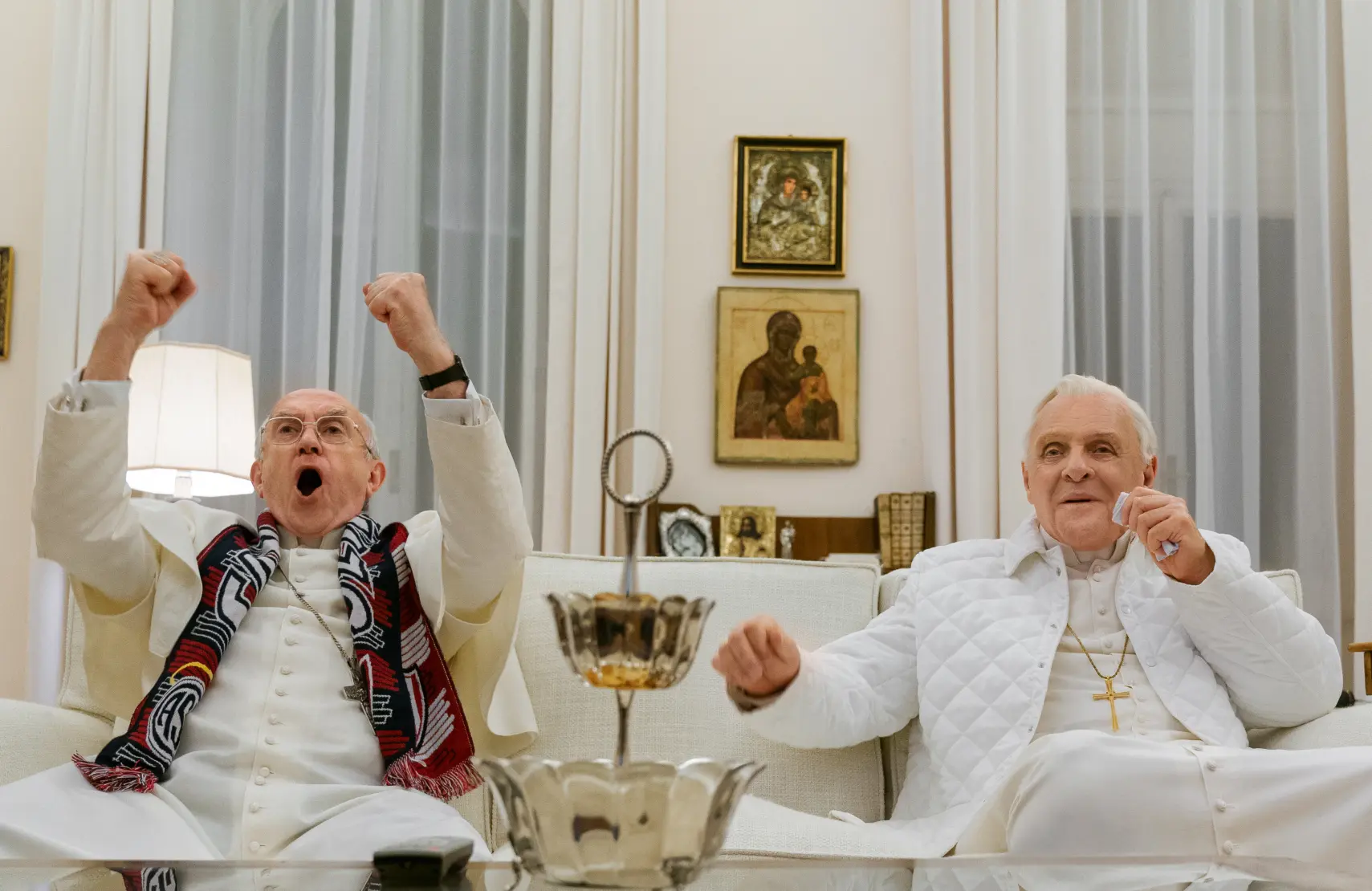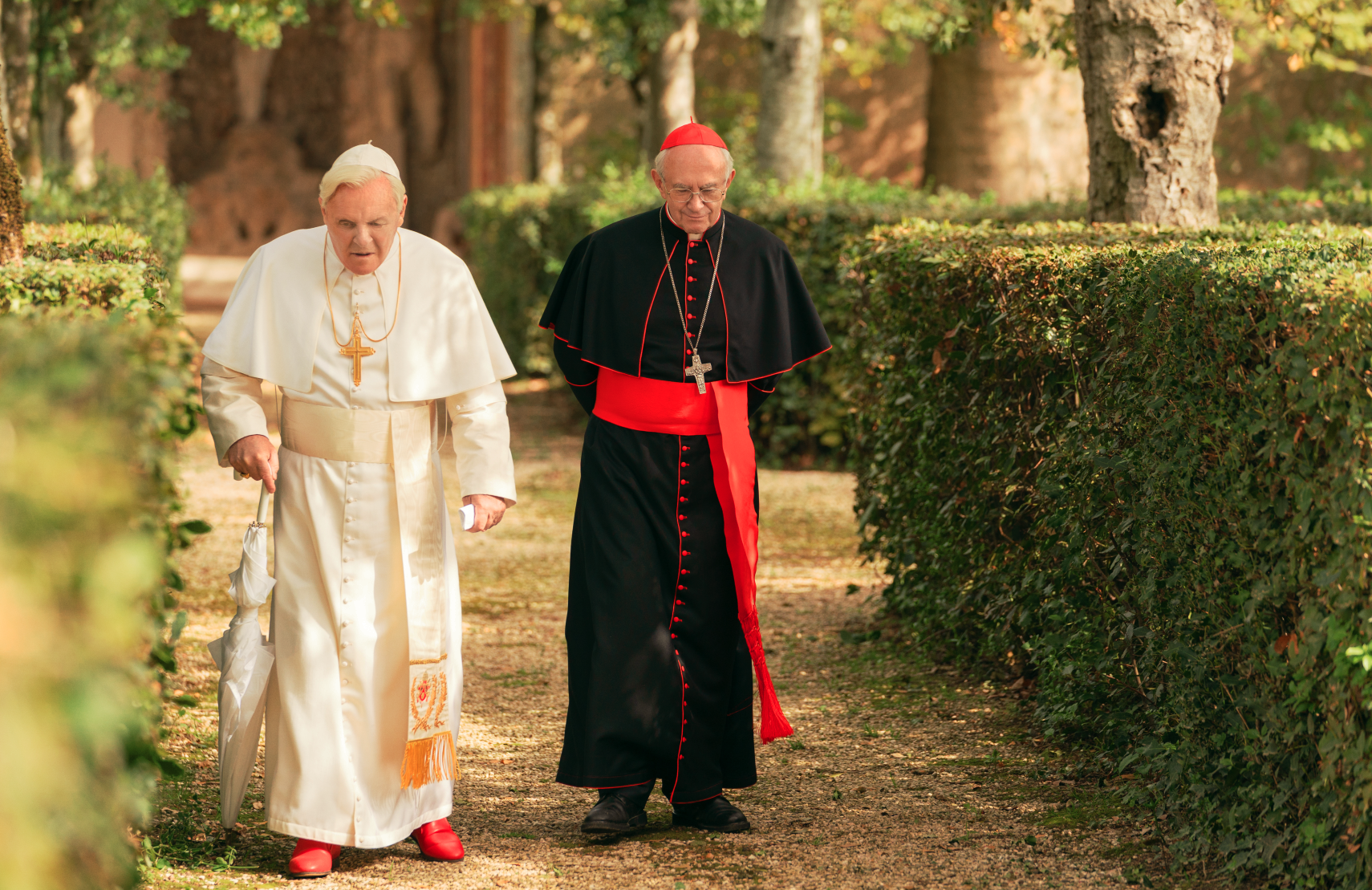The Two Popes Has a Message That Goes Way Beyond Catholicism
-
 Cardinal Bergoglio (Jonathan Pryce) and Pope Benedict (Anthony Hopkins) take a break from debating the church's future to enjoy some sport on TV. (Netflix)
Cardinal Bergoglio (Jonathan Pryce) and Pope Benedict (Anthony Hopkins) take a break from debating the church's future to enjoy some sport on TV. (Netflix)The beautifully crafted Netflix film The Two Popes is a dialogue between two generational actors, each playing a man who was selected to lead the Roman Catholic Church in the 21st century. Their debate is one that is raging inside every faith community on Earth: Is religion a tent that expands and adapts, allowing more and more seekers under its protective folds? Or is religion a mighty bulwark that the righteous run into for safety against the buffeting storm of modernity?
I raise this point because the trailer for The Two Popes makes it seem like a film specifically aimed at a Catholic audience. And then there’s that title. To Netflix’s credit, their PR staff saw this pigeonholing potential, which would explain why Anthony Hopkins and Jonathan Pryce, who play the two popes, have been out on the promotional circuit, pumping both the film's limited theatrical release last month and its premiere on Netflix today.
The Two Popes comes to us from biopic master Anthony McCarten, whose roving mind has produced films about Stephen Hawking (The Theory of Everything) and Freddie Mercury (Bohemian Rhapsody). But be warned, this is not a biopic, or bios-pic. This is essentially a stage play involving two archetypal men: Benedict, the old-school, no-compromise warhorse with the 15th-century name, and Francis, named for the saint who loved birds.
The title of the film is a nod to the fact that most popes give up the office when they die — except now we have two, since Pope Benedict XVI voluntarily abdicated in 2013 and let the college of cardinals pick his successor, Pope Francis.
Through their hour-plus running argument, The Two Popes explores a basic problem of our age. Namely, we are becoming less and less interested in the humanity of others and more interested in knowing where they stand. This is identity politics, and it’s awful. Of course, where a person stands on life-or-death issues is vitally important. But not every issue is life-or-death. And as the differences between sides are pumped up by a conflict-driven news media and special-interest groups, it gets harder and harder to see opponents as human beings created in God’s image, just like ourselves. Which is what makes this sweet little film so timely and worthwhile.
Hopkins plays Joseph Ratzinger, a cardinal in the church who spent 30 years under Pope John Paul II enforcing a theologically conservative agenda. The scene that opens the film is a reenactment of the conclave in 2005 that resulted in Ratzinger’s election as Pope Benedict XVI following John Paul’s death. The film’s director, Fernando Meirelles (The Constant Gardener), is fascinated by the details of that ultra-secretive event, much of which he covers in tight close-ups. The closing and latching of the castle door locking the cardinals inside. The tinkling of the bell. The dispersal of ballots. The clicking of hundreds of identical ballpoint pens. The rattling of wooden balls in a metal dish, each one with a voting cardinal’s name on it. The reading of votes, the burning of ballots, the whistling of ABBA’s “Dancing Queen” — wait, what?
As Meirelles explained to the Catholic site Crux, the ABBA reference is a little joke: “Everybody is looking for a king,” goes a lyric in the song. A lot of The Two Popes is like that — small, lighthearted details meant to leaven what is, at its core, a heavy extended conversation between Ratzinger and the man who finishes second to him in the balloting at the 2005 conclave, Jorge Mario Bergoglio, the Archbishop of Buenos Aires, played by Pryce.
Ratzinger, so the film asserts, saw his election as essential to carrying on John Paul’s work. Vatican insiders at the time were telling journalists as much. “Several church sources said Cardinal Ratzinger had the support of an international array of cardinals,” The New York Times reported just before the conclave. Interestingly, one of those supporters was Bergoglio, who was mentioned as a “Ratzinger protege” that could serve as a “bridge between Latin America and Europe.”
That’s not how they are depicted in The Two Popes at all. Here they uphold diametrically opposed views of how the Catholic Church should engage a changing world in the 21st century. After Benedict’s election, Bergoglio flies from Argentina to Rome to meet with the pope, and no sooner do the two men get seated than the pontiff starts in, giving his guest an earful.
“You’ve been one of my harshest critics, and there’s a lot of competition for that title,” the pope growls.
“Never directly,” protests the cardinal.
“Married priests,” barks the pope.
“I was misquoted,” Bergoglio replies.
“You openly give sacraments to those who are out of communion — to the divorced, for instance.”
“I believe that giving communion is not a reward for the virtuous,” counters Bergoglio, “it is food for the starving.”
“Ah,” clucks Benedict, like he has the cardinal in a trap. “So what matters is what you believe and not what the church has taught for hundreds of years.”
The Argentinian coolly counters with Mark 2:17 — “I came to call sinners” — which, he notes, “the church has taught for thousands of years.”
And as Cris Collinsworth would say, here we go.

The differences between the two men are accentuated by their physical bearings. Benedict has no use for gardens, sports, socializing, jokes, or friends. He moves slowly and has a chronic cough. He loves the trappings of power: the fancy summer estate, the papal helicopter, the deference of underlings. Bergoglio is a people’s priest, fond of making his own travel arrangements. There’s a spring in his step, which figures since he regularly dances the tango — with a female partner, even. “In Argentina,” he explains to the puzzled pontiff, “football and tango are compulsory.”
All of this is magazine-variety detail. You’re not going to discover the “real” Francis or the “real” Benedict watching The Two Popes. The conversation is what matters here. This film reminds me a lot of a book I read in college called Between Heaven and Hell. It was an imagined dialogue between President Kennedy and authors Aldous Huxley and C.S. Lewis. Why these three? Because they all died within hours of each other. While they wait in some cosmic holding area, they begin discussing eternal issues from Catholic (JFK), skeptic (Huxley), and evangelical viewpoints (Lewis). For me, reading that fictive conversation was a powerful early reminder that people who believe and do things that I strongly disapprove of nonetheless share a common humanity with me. In my faith that means they have an essential worth and dignity that I must never forget.
But… since The Two Popes is light entertainment and not a book, Meirelles has to take occasional breaks from the verbal jousting. The two clerics argue for a while, then settle back for TV or some chitchat. Benedict sits down at the piano and serenades Bergoglio. As the film progresses, the conversation shifts away from the abstract and the political to the personal and the spiritual. Both men are readying themselves for what it about to happen, unprecedented in modern times: one pope of sound mind, voluntarily relinquishing his title. Whether it went down exactly the way it’s depicted in this film is beside the point. The succession of Benedict by Francis was a momentous event, and was largely overlooked at the time, as the news media was swept up in good feelings about the new pope.
If nothing else, The Two Popes reminds us that the peaceful transfer of power, wherever it occurs, is a kind of miracle in and of itself. And that’s a good message in this impeachment... I mean, this Christmas season.
Aaron Barnhart has written about television since 1994, including 15 years as TV critic for the Kansas City Star.
TOPICS: The Two Popes, Netflix, Anthony Hopkins, Jonathan Pryce